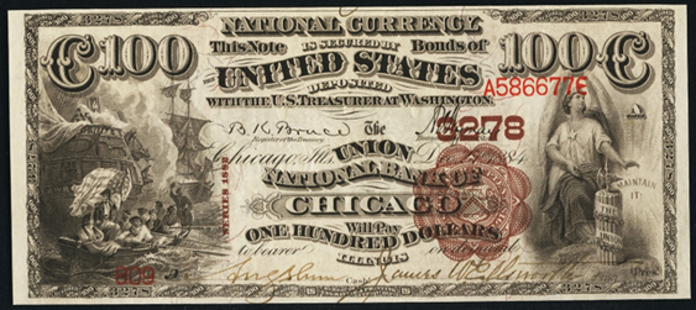One Hundred Dollar Notes › Nationals › 1882 One Hundred Dollar National Bank Notes › Louisiana Charters › 1882 $100 Homer Louisiana Homer National Bank
Get Value Now
| Item | Info |
|---|---|
| Series | 1882 |
| Charter | #4216 Homer National Bank of Homer, Louisiana |
| Year Chartered | 1890, 304 Banks Chartered |
| City Info | Homer is a town in and the parish seat of Claiborne Parish in northern Louisiana, United States. Named for the Greek poet Homer, the town was laid out around the Courthouse Square in 1850 by Frank Vaughn. The present-day brick courthouse, built in the Greek Revival style of architecture, is one of only four pre-Civil War courthouses in Louisiana still in use. The building, completed in 1860, was accepted by the Claiborne Parish Police Jury on July 20, 1861, at a cost of $12,304.36, and is on the National Register of Historic Places. Its courthouse, built in 1860, is one of four courthouses in Louisiana built before the Civil War that are still used today, the others are in St. Francisville, St. Martinville, and Thibodaux. Source: Wikipedia |
| Similar Cities | If your note doesn't match try: 1. Homer, Illinois - First National Bank |
| Seal Varieties | Brown, Blue |
| See Also | If your note doesn't match try: 1. 1882 $100 Gold Certificate 2. 1878 $100 Legal Tender 3. 1880 $100 Legal Tender |
| Other Info | 1. Value depends on notes known for charter, condition and market demand. 2. Rare and highly desirable National Note. |
| Neat Fact | Date Backs issued in sheets of 2 Notes: 1 $50 Note & 1 $100 Note (Friedbergs, 20th Ed. P119) |
No Obligations Offers and Appraisals
Please submit a good photo or scan. It will be identified and evaluated. Understand there may be subtle differences between the image you see above and your note. Signatures, design, markings and note condition will determine the offer price. Notes in Uncirculated or better condition receive the best offers.
Appraisals can be estimated for wholesale and retail prices. Wholesale is what dealers typically pay. Retail is what a collector might pay. Retail is slightly higher in most cases.
Please visit this page for USA Paper Money Reference. Do not treat this page as a reference guide, it is for appraisal and acquisition purposes only.
